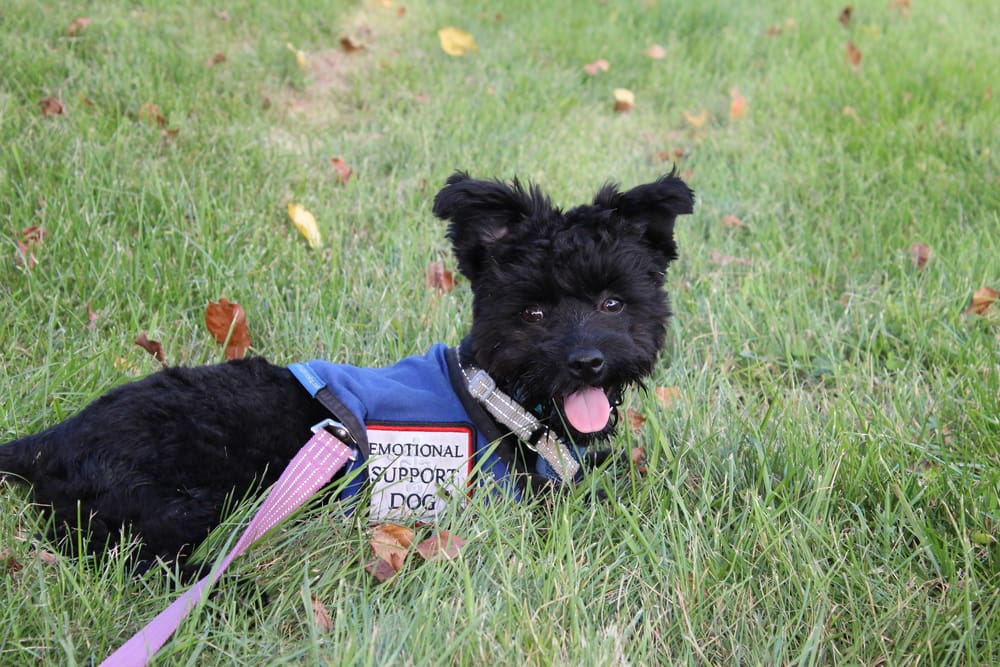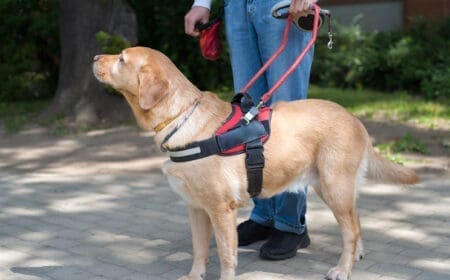Emotional support animals, or ESAs, are animals that offer comfort and support to their owners through their physical presence. While ESAs aren’t covered under the Americans with Disabilities Act (ADA) like service animals are, they are entitled to certain legal protections and rights.
If you want to own an ESA in the state of Virginia, it’s vital you understand the specific regulations, rights, and responsibilities pertaining to ESAs.
Our guide below covers everything you need to know about Virginia’s emotional support animal laws, from travel legislation to housing rights. We will also discuss how exactly to get, or have your pet recognized as, an ESA.
What Is an Emotional Support Animal in Virginia?
An emotional support animal provides comfort, emotional relief, and companionship to people struggling with mental health issues. They are not trained to perform any specific disability-mitigating tasks — they assist simply by being present.
Any type of animal can become an ESA, including rabbits, birds, hamsters, horses, and even reptiles, though dogs and cats are the most common.
What Is the Difference Between an ESA and a Service Animal?
A common misconception is that emotional support animals and service animals are the same thing. While they both provide their owner companionship, that’s the only similarity they share.
Service animals are specifically trained to perform specialized tasks that alleviate disability-related symptoms, such as retrieving medication and deep pressure therapy. They are protected under the Americans with Disabilities Act, in addition to state laws, to ensure they can perform these trained tasks with ease.
Some of the legal protections service animals receive include:
- Public access rights
- Able to fly in airplane cabins at no additional cost
- Can accompany their handler in the workplace
- Can live with their handler without additional fees, even in an accommodation that typically doesn’t allow pets
Emotional support animals, on the other hand, do not undergo any disability-related training and aren’t considered working dogs by the ADA. Because of this, they aren’t granted the same level of legal protection and can only accompany their owners in public areas that allow dogs.
However, ESAs do have housing rights, something we will discuss in depth below.
Emotional Support Animal Laws in Virginia
The state of Virginia does not recognize ESAs as service animals, meaning ESAs aren’t entitled to public access rights, flight fee exemptions, and workplace accommodations.
However, federal laws, such as the Fair Housing Act (FHA), protect ESAs and Virginia state laws uphold this federal regulation.
Virginia Emotional Support Animal Housing Laws
Virginia ESA housing laws align with the Fair Housing Act. The FHA was established to stop discrimination during the sale, rental, and financing of housing. Protected characteristics include race, religion, nationality, disability, familial status, and gender.
Since service dogs and emotional support animals help the well-being of those with disabilities, they are protected under the FHA. Landlords must accommodate ESAs, even if they typically don’t allow pets at the property, and they can’t charge pet fees or additional security deposits.
ESAs are also exempt from any pet policies and restrictions within a property. This means landlords can’t enforce breed restrictions or size limits and must accept all species unless exceptional circumstances apply. The biggest examples of this are the animal posing a health and safety risk to others or not being able to comfortably live within the space.
However, keep in mind that certain properties do not legally have to accommodate ESAs. These include:
- Owner-occupied rental houses with four or fewer units
- Single-family housing sold or rented without the use of a broker (if the private owner does not own more than three single-family homes)
- Religious organizations and private clubs are allowed to give preference to members
To be covered under the FHA, individuals must obtain an ESA letter from a licensed healthcare professional. In fact, this is the case for virtually every federal and state law relating to ESAs, so it’s important you familiarize yourself with how to acquire an ESA letter.
Emotional Support Animal Travel Laws
Unfortunately, ESAs do not receive any additional protections when it comes to travel. They are not legally required to be permitted on public transportation, whether train, bus, or car.
Emotional support animals used to be protected under the Air Carrier Access Act (ACAA). However, in 2021, the Department of Transport (DOT) made significant changes to this legislation which gave US airlines the choice on whether or not to accommodate ESAs.
Virtually every major US airline no longer recognizes ESAs and now considers them as pets, meaning standard pet restrictions, fees, and policies apply.
Keep in mind that if your ESA is allowed on board, airlines often require them to be kept within a secure carrier during the flight. You can also be removed from the plane or fined if your animal exhibits disruptive or aggressive behavior.
If you intend to travel abroad in the near future, you should contact the airline directly to find out how exactly they accommodate ESAs. Most airlines will only accept dogs and cats on board, so you will likely need to arrange an alternative travel means if your ESA is a different species.
Virginia Emotional Support Workplace Laws
Under the ADA, employers are prohibited from discriminating against employees with disabilities and must reasonably accommodate them.
Essentially, this means that employers are required to make changes where possible to the work environment to ensure the individual is able to properly perform their day-to-day job tasks. Some reasonable accommodations include flexible working hours, reserved parking, and improved workplace accessibility.
Unfortunately, the ADA does not include ESAs in its definition of protected service animals, and employers are therefore not legally required to permit them in the workplace.
If you wish to bring your ESA into the workplace, you will need to speak to your employer and discuss their policies and whether they will accommodate your ESA. Be prepared to explain why you need an ESA at work and how this will benefit your focus, productivity, and confidence.
Keep in mind that if your employer does approve your request, your ESA will be expected to be well-behaved and adequately trained for a work environment. You will also need to abide by the workplace’s pet policies and regulations.
Can I Bring My Emotional Support Animal to Public Places in Virginia?
Unfortunately, current Virginia emotional support animal laws do not grant ESAs public access rights.
While some businesses and public areas may allow this at their personal discretion, ESAs are not legally required to be allowed in public spaces. This includes spaces like restaurants, stores, libraries, community centers, and hotels. They must follow the area’s standard pet rules.
Fortunately, many restaurants, cafes, and parks in Virginia have opted to accommodate ESAs. However, when you are in these public spaces, it is expected that your ESA will be well-behaved and not disturb other people. Organizations have the right to remove you from the premises if your ESA doesn’t behave in an acceptable manner.
Virginia Leash Laws
Virginia does not impose a statewide leash law, though several cities, towns, and counties have established their own regulations. In most places, dogs, including ESAs must be kept leashed at all times when outside unless they are in a designated off-leash area. Owners should also have full control over their pets.
You can find out your local area’s leash laws on Municode — select your city, town, or county and then enter “leash” or “dog” in the search bar to bring up the leash regulations. Keep in mind that several local jurisdictions also restrict the leash length. For example, in Bedford, VA, dogs must be kept on a leash no more than eight feet in length.
How to Get an Emotional Support Animal in Virginia


To legally qualify for an ESA in Virginia, you must have an emotional or mental health disability that has been diagnosed by a practicing medical professional. These may include psychologists, therapists, or psychiatrists. You will also need to obtain an official ESA letter.
What Is an Emotional Support Animal Letter?
An ESA letter is a document signed by a licensed mental health professional (LMHP) which outlines your need for an emotional support animal.
More specifically, it will state that you have a qualifying mental health condition, such as depression, anxiety, or chronic stress. It will also state that an ESA plays a vital part in your treatment plan, meaning the animal helps manage your condition and mitigates symptoms. The letter does not have to specify your disability.
The ESA letter should be printed on the mental health professional’s official letterhead and include the following information:
- The LMHP’s medical license number, type, and issue date, as well as the state they’re licensed to practice in
- The LMHP’s official signature and contact information (usually a phone number)
- The date the ESA letter was issued
- The name of the practice
- The specific animal that fulfills the role of an ESA for you (species and/or breed)
To get an ESA letter, you will need to book a consultation with an LMHP to be assessed for your eligibility.
During the consultation, you should inform the LMHP about your disability and how your pet has helped, or how an ESA would help, alleviate one or more symptoms. If applicable, you may also want to talk about the difficulties you have faced because your pet isn’t currently considered an ESA (e.g. not being able to find a place to live).
If the medical professional determines you qualify for an ESA, they will then write you an ESA letter.
Your ESA letter will have an expiration date, usually a year or two after the letter is first written. You will need to consult with your provider again at this time to receive a new letter and evaluation of your condition.
Additionally, you should renew your ESA letter if you are moving to a different state, where different legislation may apply. California, for example, has a 30-day provider-patient relationship requirement for an ESA to be valid.
If you’re moving and don’t have an LMHP contact in your destination state yet, we can help – just fill out our ESA consultation form and we’ll be in touch.
Virginia Emotional Support Animal Laws FAQ
Navigating Virginia’s emotional support animal laws can be challenging and it’s easy to get confused — there’s plenty of misinformation and out-of-date advice on the web. We’ll answer some common questions about ESAs in Virginia below to help clear up any confusion you may have.
Can I Get an ESA Letter Online?
There are several online websites that claim to offer an ESA letter for a fee. However, we strongly advise against using these websites without doing thorough research.
If you choose to pursue an online ESA letter, you’ll want to make sure that the LMHP signing off does a consultation with you and is licensed in your state of residence. When you work with us, you can rest assured that our team of mental healthcare professionals has you covered.
In your consultation, you’ll want to bring any diagnoses you’ve had previously, as well as details on how an ESA would benefit your life.
Does an ESA Need to Be Certified or Registered in Virginia?
No, ESAs do not need to be “officially” certified or registered — you only need an ESA letter from an LMHP.
Registration does have benefits like easy status identification to avoid prodding questions from strangers, but be careful. There are many websites online that claim they will register or certify your ESA for a fee, but many of these are unfortunately scams, so it’s important to be discerning when seeking ESA registration.
Can I Have Multiple ESAs in Virginia?
Yes, you can have multiple emotional support animals in Virginia, as there are no state or federal laws that limit how many ESAs you are allowed to have. If you require multiple ESAs, you must make sure that your ESA letter clearly documents each animal, and that each animal is necessary for treating your condition.
However, keep in mind that having multiple ESAs can make it difficult for landlords to accommodate you. Even with the Fair Housing Act, ESAs can still be denied if the space can’t reasonably support several animals.
Does an ESA Need to Be Trained in Virginia?
Unlike service animals, ESAs do not need any disability-related training since they provide comfort and support through their presence. However, it’s important you have full control over your ESA. Your ESA can be removed from any ESA-friendly premises if they exhibit disruptive behavior, have caused property damage, or are a threat to the safety of others.
Understanding Your Virginia ESA Rights
An emotional support animal can help alleviate symptoms of mental health conditions by providing comfort, reassurance, and security. For many, ESAs are life-changing companions; they truly improve emotional well-being and help individuals navigate their day-to-day lives.
While ESAs don’t have the same extensive legal protections as service animals in Virginia, they are still covered under the Fair Housing Act, and many public spaces and employers have opted to accommodate ESAs on their own volition.
You can adopt an animal from a local rescue shelter in Virginia to become your ESA. However, keep in mind that owning a pet is a huge commitment and isn’t something to take lightly. You must be able to properly care for them and afford expenses such as food, grooming supplies, and vet fees. You can discuss all this, and obtain an ESA letter, with an LMHP in your area.




